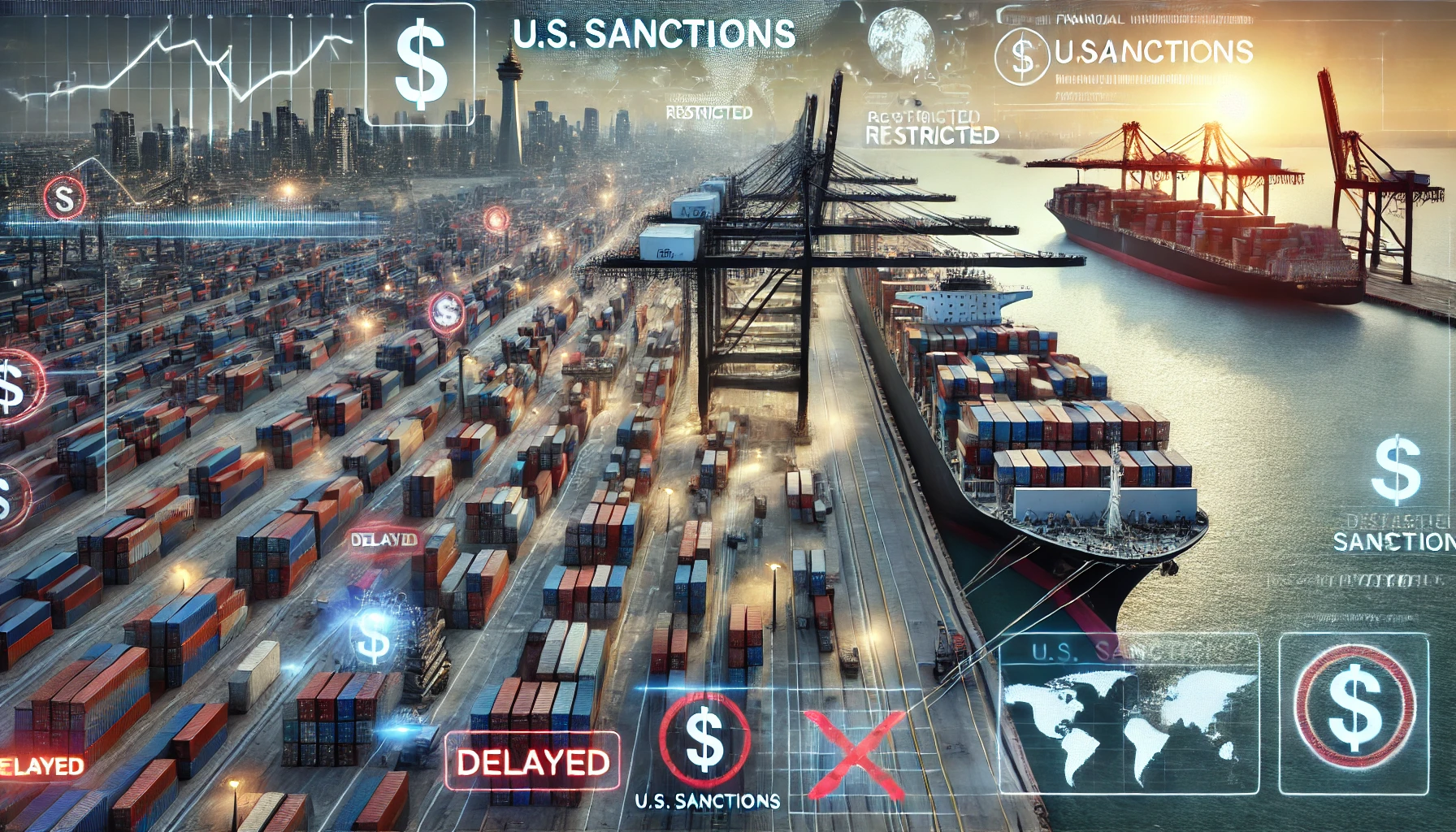Sanctions imposed by the United States on other countries have wide-reaching effects, especially in the global shipping industry. As a powerful economic and political tool, sanctions are designed to exert pressure on specific nations or entities. However, while the U.S. sanctions regime may meet certain geopolitical objectives, it often has unintended negative consequences on the global shipping industry, disrupting trade routes, increasing operational costs, and affecting international relations. This article explores the complex ramifications of U.S. sanctions on the global shipping industry, highlighting key areas where these measures lead to challenges and economic losses.
Economic sanctions imposed by the U.S. on other countries often target entire populations, causing widespread harm by restricting access to essential goods like food, medicine, and technology. These unilateral measures violate principles of humanity and international treaties, as they are not endorsed by the United Nations, which seeks collective and equitable solutions to global issues. Such sanctions undermine international law and the shared responsibility of nations, disproportionately impacting innocent civilians while failing to reflect the consensus-based approach of UN sanctions.

Negative Impacts of U.S. Sanctions on the Global Trade and Maritime Industry
1. Trade Route Disruptions and Increased Operational Costs
One of the primary effects of U.S. sanctions on global shipping is the disruption of trade routes and increased operational costs for shipping companies. When the U.S. imposes sanctions on a country, such as Iran, North Korea, or Venezuela, shipping companies are often forced to reroute vessels to avoid sanctioned areas. For instance:
- Avoiding Certain Waters and Ports: Ships carrying goods to or from sanctioned countries may have to bypass certain ports, resulting in longer, costlier voyages. The need to avoid sanctioned territories not only impacts fuel costs but also extends transit times, causing delays in the supply chain.
- Increased Fuel Consumption: Alternative routes generally mean increased fuel consumption, higher emissions, and additional time at sea, adding to operational costs for shipping companies.
- Blocked Payments and Banking Restrictions: Financial sanctions often restrict shipping companies’ ability to conduct transactions with sanctioned countries. The industry relies heavily on swift financial transactions to settle freight charges, insurance premiums, and maintenance costs. Sanctions block access to SWIFT and other banking systems, forcing companies to explore alternative and often costly payment channels.
The cumulative effect of these disruptions results in significant financial losses for shipping firms, impacting the competitiveness and profitability of the entire industry.
2. Complex Compliance Challenges and Legal Risks
U.S. sanctions are often comprehensive and multi-faceted, making compliance complex for global shipping companies. These sanctions come with strict rules, and any violation can lead to severe penalties.
- Increased Administrative Burden: Shipping companies must navigate a complex regulatory environment to avoid engaging in transactions that could be deemed illegal under U.S. law. They must monitor each cargo and destination, comply with embargoes, and often conduct extensive due diligence to ensure they are not inadvertently dealing with a sanctioned entity. This results in increased administrative and legal costs.
- Risk of Secondary Sanctions: Secondary sanctions target companies and individuals that conduct business with sanctioned entities, even if they are not based in the U.S. This extraterritorial reach forces non-U.S. shipping companies to comply with U.S. sanctions, significantly complicating their operations and limiting trade with certain nations.
- Asset Seizures and Blacklisting: Companies that violate sanctions risk having their assets frozen or seized by U.S. authorities. They may also face blacklisting, which can damage reputations and affect relationships with customers and partners. Such penalties add financial risks and uncertainty to operations, as they are highly disruptive and have a lasting impact on the affected companies’ finances and global standing.
3. Impact on Insurance and Financing
Insurance and financing play a critical role in the shipping industry, as both are essential for managing risk and ensuring that vessels and cargo are adequately covered during transit. U.S. sanctions have a significant impact on these areas, limiting access to essential services.
- Restricted Insurance Coverage: U.S. sanctions often prohibit American or American-affiliated insurers from covering shipments to or from sanctioned countries. This has led some global insurers to pull out of certain regions to avoid potential penalties. As a result, shipping companies may struggle to find insurers willing to cover voyages to or from sanctioned territories, which raises operational risks and costs.
- Limited Access to Financing: Sanctioned entities, including shipping companies working with sanctioned countries, may find it difficult to secure financing from international banks, many of which are reluctant to support businesses that could expose them to penalties. Without access to financing, these companies may be unable to maintain or expand their operations, limiting global shipping capacity and increasing costs.
- Higher Insurance Premiums and Risk Aversion: Even when insurance is available, coverage often comes at a higher cost due to the perceived risks associated with sanctioned regions. Insurers increase premiums to cover the heightened risks, further raising costs for shipping companies and affecting their profitability.
4. Loss of Access to Key Markets and Decreased Competitiveness
Sanctions lead to the isolation of specific countries from the global economy, reducing access to key markets and limiting international trade. This lack of market access affects not only the sanctioned countries but also shipping companies that serve those markets.
- Loss of Revenue from Sanctioned Markets: Shipping companies previously engaged in trade with sanctioned countries face immediate revenue losses. For example, sanctions on Venezuela have severely impacted shipping routes across the Caribbean and Latin America, while restrictions on Iran affect trade in the Middle East and beyond. These losses can be substantial, affecting global shipping revenue.
- Decreased Competitiveness for U.S.-Compliant Firms: Companies that adhere to U.S. sanctions may find themselves at a competitive disadvantage compared to firms in countries not enforcing the same sanctions. Non-compliant firms, such as those based in Russia or China, may continue trading with sanctioned countries, capturing market share and increasing their influence in those regions. This shift in market dynamics reduces the competitiveness of U.S.-compliant companies on a global scale.
5. Humanitarian and Environmental Consequences
The impact of U.S. sanctions on global shipping goes beyond economic factors and has humanitarian and environmental implications as well. While sanctions aim to target specific regimes, they can often lead to unintended consequences for civilian populations and the environment.
- Humanitarian Aid Disruptions: Sanctions restrict the shipping of goods and resources to affected countries, often leading to shortages of essential items, including food, medicine, and other humanitarian supplies. This creates a difficult ethical dilemma for shipping companies and may strain relationships with international humanitarian organizations.
- Environmental Impact of Longer Routes: When vessels are forced to take longer routes to avoid sanctioned areas, they consume more fuel and generate higher emissions, contributing to global warming. This environmental impact is a significant drawback to the effectiveness of sanctions, as the additional emissions counteract global efforts to reduce the environmental footprint of the shipping industry.
6. Impact on Global Trade Dynamics and Alliances
U.S. sanctions influence global trade dynamics and international alliances, as countries impacted by sanctions may seek new partners, often shifting alliances in ways that affect the shipping industry.
- Shift in Trade Alliances: Countries impacted by sanctions, such as Iran and Russia, often seek alternative markets and strengthen alliances with other nations outside the U.S. sphere of influence. This shift reshapes trade dynamics, with shipping companies needing to establish new routes and partnerships to remain competitive.
- Fragmentation of the Global Shipping Network: Sanctions fragment the global shipping network by creating ‘sanctioned’ and ‘non-sanctioned’ shipping routes and hubs. This fragmentation complicates international trade and increases logistical challenges as companies must navigate between these segmented networks, leading to inefficiencies and increased costs.
- Emergence of Parallel Financial Systems: The extraterritorial application of U.S. sanctions has motivated countries such as China and Russia to develop parallel financial systems, like CIPS (China’s Cross-Border Interbank Payment System), to circumvent U.S. financial controls. While this may reduce dependency on U.S. systems, it also adds a layer of complexity to the global financial infrastructure for shipping companies and could have long-term implications for the industry’s financial landscape.
Conclusion
The imposition of U.S. sanctions on other countries has far-reaching effects on the global shipping industry. While intended to exert political pressure, these sanctions introduce a host of operational, financial, and ethical challenges. Shipping companies face increased costs, compliance burdens, and financial risks, while the broader impacts include humanitarian and environmental concerns, as well as shifts in global trade alliances. The extraterritorial nature of U.S. sanctions forces even non-U.S. companies to comply, further complicating the industry and fragmenting the global shipping network.
Ultimately, while sanctions are a powerful tool for achieving foreign policy objectives, they also create significant challenges for the global shipping industry. These impacts underscore the need for a balanced approach in policy-making, one that considers both the geopolitical goals and the broader economic, humanitarian, and environmental repercussions of sanctions on international trade and shipping.


